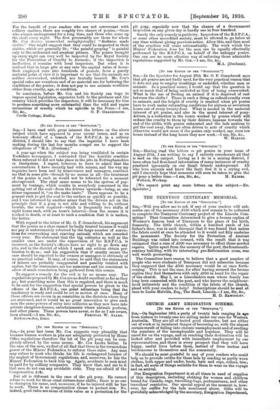[TO THEDITOR OE THE " spEcTAToa.. - ]
Suk—I have read with great interest the letters on the above subject which have appeared in your recent issues, and as an honorary official of a branch of the R.S.P.C.A. in a colliery district, I should like to say that the inquiries I have been making during the last few months compel me to support the allegations of "M.A. (Durham)."
A year ago when the subject was being ventilated in certain Yorkshire newspapers, "I 'Contended that the horrible cruelties there referred to did not take place in the pits in Nottinghamshire or Derbyshire. I regret, hdwever, to have to admit that the conversations I have recently had with miners, and the way. Aly inquiries have been met by nuneowners and managers' convince me that in some pits—though by no means in all—the treatment of the ponies is such as would not be tolerated for a moment aboveground. The chief cause seems to be the system of pay- ment by tonnage, which results in everybody concerned in the getting out of the coal—from the drivers upwards—being, as one miner expressed it, "on the make haste." There appears to be a general rush to get the coal to the surface as quickly as possible, and I was informed by another miner that the drivers act on the principle that if a pony is not able and willing to do, without trouble, the work required—which is frequently two shifts of eight hours each, with an hour's interval—then the sooner it is worked to death, or at least to such a condition that it is useless, the better.
With regard to the letter of Mr. 0. F. Grazebrook, his argument that the ponies as a class cannot be badly treated because it would not pay is unfortunately rebutted by the large number of convic- tions for overworking and starving animals which are recorded every year. His statement that the big collieries as well as the
smaller ones are under the supervision of the is incorrect, as the Society's officers have no right to go down any pits, and in the district of which I speak can seldom obtain per- mission to do so ; and his suggestion that if cruelty qccurs the case should be reported to the owners or managers is obviously of no practical value. It may, of course, be said that the statements of miners are probably exaggerated and possibly tainted with malice, but the statements are too numerous and too consistent to allow of much consolation being gathered from this source.
To suggest a remedy for the evil is by no means easy. The regulations proposed by Mr. Cox are no doubt excellent as far as they go ; but something more than this isrequired, and there is much to be said for the suggestion that special powers be given to the officers of the 13..S.P.O.4.., one great advantage being that the machinery is ready and could be set in motion at once. Many of these officers are sworn in as constables in the districts where they are stationed, and it would be no great innovation to give such men the same powers of entry into collieries as they now have into private slaughter-houses, entertainments where animals perform, and other places. These powers have never, so far as I am aware,






































 Previous page
Previous page